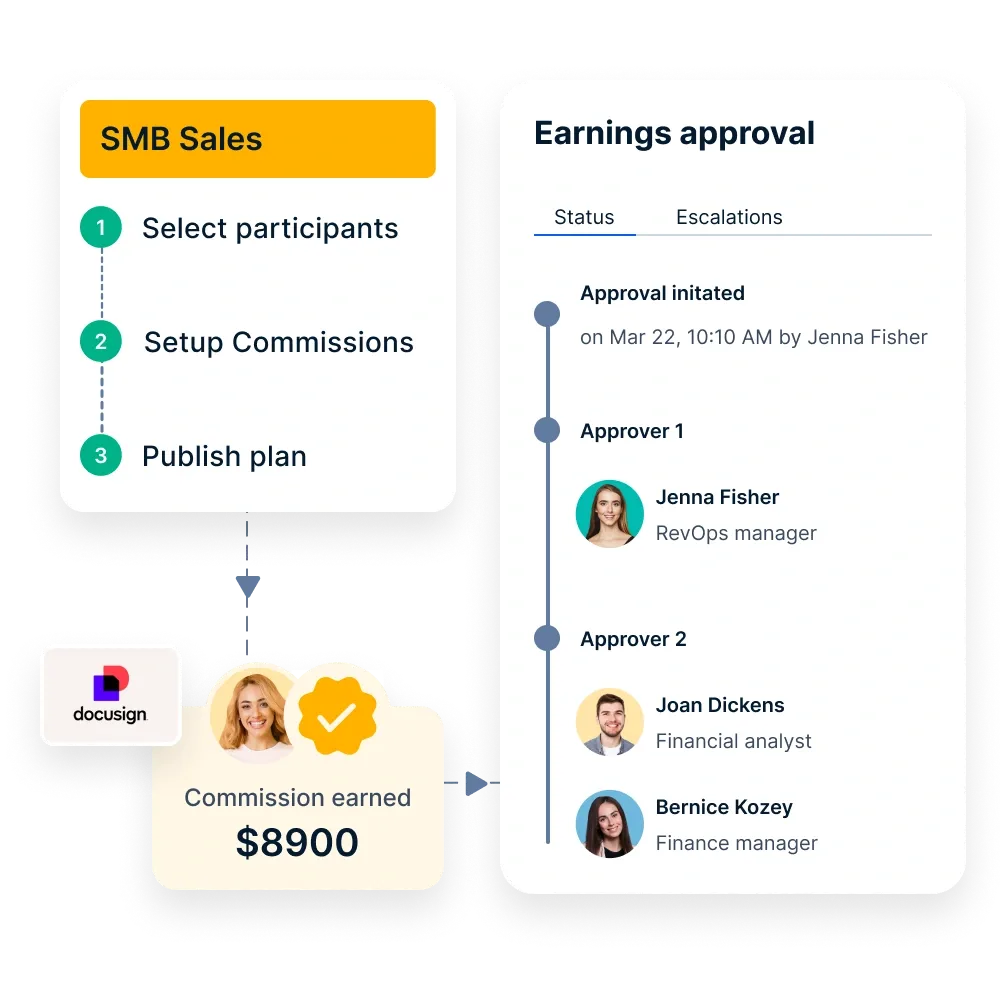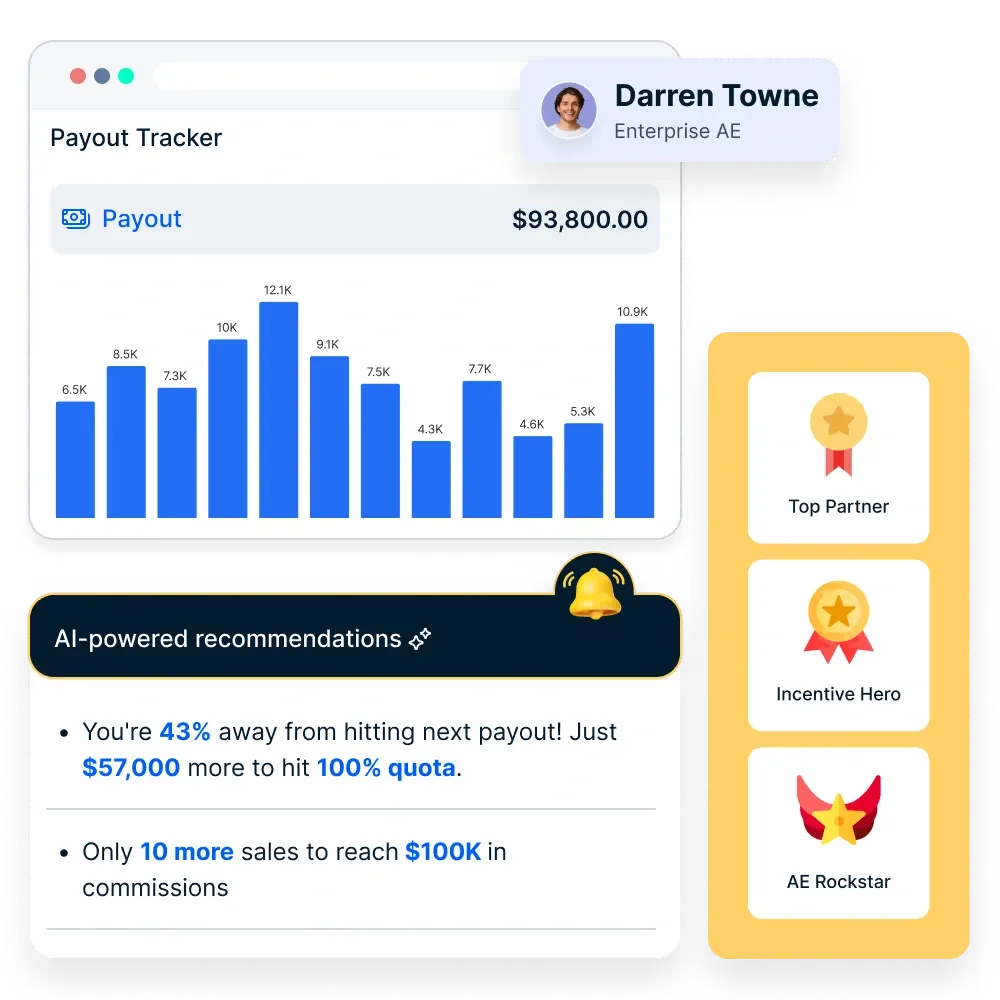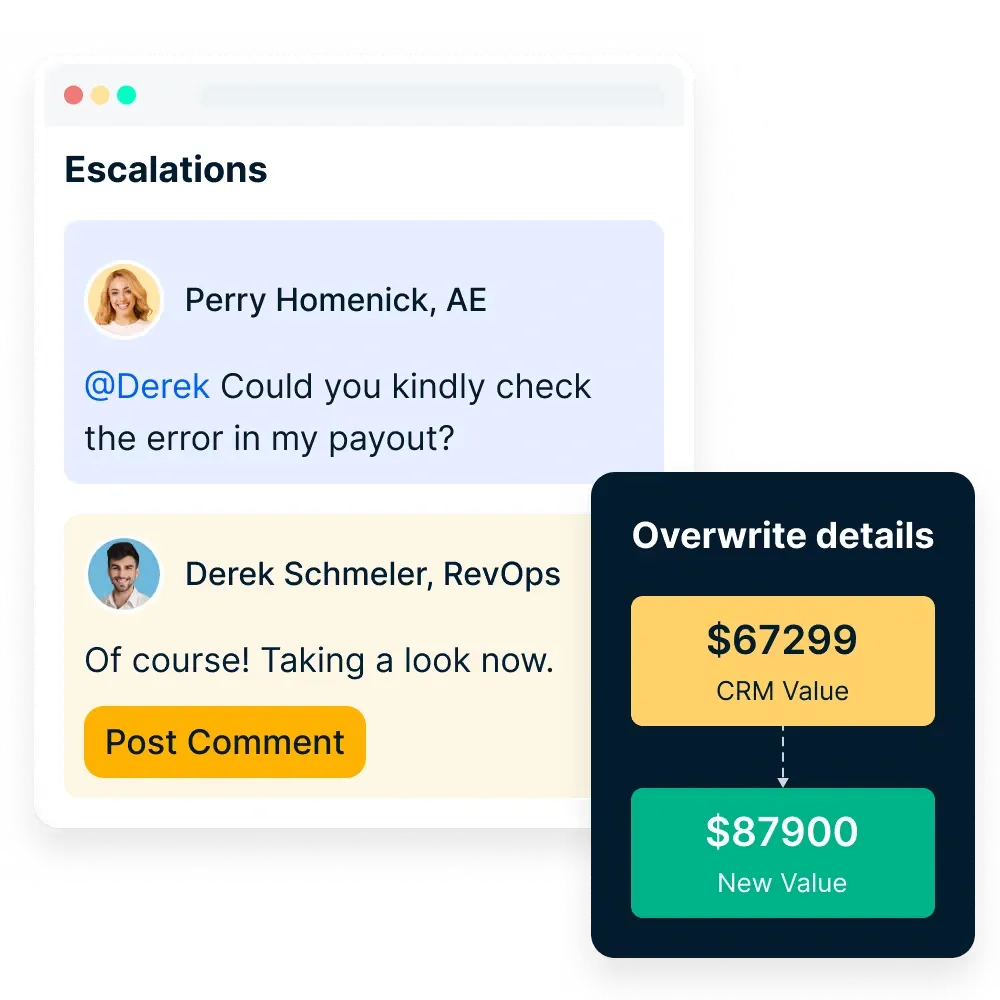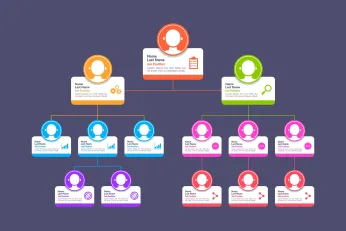Wie man eine erfolgreiche Verkaufskultur in 8 Schritten für den Geschäftserfolg aufbaut
Eine starke Vertriebskultur ist der Schlüssel zu mehr Umsatz, Motivation und langfristigem Erfolg. Befolgen Sie diese 8 Schritte, um ein florierendes, leistungsstarkes Vertriebsteam aufzubauen.
Auf dieser Seite
Die Vertriebskultur kann ein wenig unklar sein. Im Gegensatz zu Kennzahlen wie monatlicher Umsatz, E-Mail-Aktivität, durchschnittliche Betriebszugehörigkeit oder Quotenerfüllung lässt sich ihre Qualität nicht so leicht messen. Das schmälert jedoch nicht ihre Bedeutung.
Die Vertriebskultur eines Unternehmens spielt eine entscheidende Rolle für die Produktivität des Teams, die Mitarbeiterbindung und die Gesamtrentabilität.
Um Ihre eigene Verkaufskultur zu bewerten, müssen Sie zunächst verstehen, was sie ist. Anhand dieses Verständnisses können Sie feststellen, ob Änderungen erforderlich sind.
In diesem Artikel werden wir untersuchen, was Vertriebskultur bedeutet und warum sie wichtig ist. Wir werden auch die Schlüsselelemente einer erfolgreichen Unternehmenskultur betrachten, Anzeichen erkennen, die auf einen Veränderungsbedarf hindeuten, und neun effektive Tipps für den Aufbau oder die Aufrechterhaltung einer starken Vertriebskultur geben.
Was ist Vertriebskultur und warum ist sie wichtig?
Die Vertriebskultur bezieht sich auf die Einstellungen, Werte und Gewohnheiten Ihres Vertriebsteams. Eine starke Vertriebskultur lässt sich oft mit ein paar Schlagworten wie "ethisch", "motiviert" und "professionell" beschreiben.
Eine positive Verkaufskultur ermutigt Ihr Team, sich stärker zu engagieren. Sie ermöglicht es jedem Vertreter, eine Führungsrolle zu übernehmen. Wenn die Kultur gut ist, verbessert sich die Teamdynamik, und die einzelnen Vertriebsmitarbeiter sind eher bereit, sich beruflich weiterzuentwickeln.
Ihre Vertriebskultur prägt die Art und Weise, wie Teammitglieder miteinander und mit potenziellen Kunden umgehen. Ohne eine klare und positive Vertriebskultur kann Ihre Vertriebsstrategie nicht erfolgreich sein. Die meisten Unternehmen wissen, dass Probleme mit der Vertriebskultur den Erfolg einschränken können. Daher sollten Sie die folgenden Hinweise beachten, um zu verstehen, dass diese Anzeichen eine Veränderung der Vertriebskultur erfordern:
- Hohe Fluktuation unter den Handelsvertretern
- Ressentiments oder Rivalitäten zwischen Teammitgliedern
- Schlechte Einstellung zum Vertriebsmanagement oder zur Führung
- Ein allgemeiner Mangel an Kameradschaft
- Das Erkennen dieser Anzeichen kann Ihnen helfen, ein besseres Umfeld für Ihr Verkaufsteam zu schaffen.
Nach Angaben von HBRbestehen "erfolgreiche Kulturen aus zwei miteinander verbundenen und sich gegenseitig verstärkenden Elementen. Erstens hat jedes leistungsstarke Unternehmen eine einzigartige Identität - charakteristische Merkmale, die es von anderen Organisationen unterscheiden. Diese Merkmale geben den Mitarbeitern ein Gefühl von Sinn, allein dadurch, dass sie Teil des Unternehmens sind. Sie schaffen auch Leidenschaft für das, was das Unternehmen tut.
Diese Worte haben bei einigen Führungskräften Widerhall gefunden. Nehmen Sie diese beiden Führungskräfte als Beispiel:
- Alan Mulally hat bei der Ford Motor Company einen Geist der Teamarbeit geschaffen. Dieser Ansatz trug dazu bei, das Unternehmen neu auszurichten und zu beleben und einen langen Rückgang des Marktanteils zu stoppen.
- Herb Kelleher förderte bei Southwest Airlines eine Unternehmenskultur, die die Mitarbeiter stärkt und die Kosten kontrolliert. Dank dieser Strategie konnte sich die Fluggesellschaft zu einer der angesehensten und profitabelsten der Welt entwickeln.
Ein kleiner Kultur-Check kann für ein Unternehmen Wunder bewirken, insbesondere für das Vertriebsteam, das das Rückgrat eines SaaS-B2B-Unternehmens ist.
Wie lässt sich eine gute Verkaufskultur beschreiben?
Die Kultur Ihrer Organisation prägt, was Sie tun und wie Sie es tun. Sie beeinflusst, wer daran beteiligt ist, wo es geschieht, wann es stattfindet und warum es wichtig ist. Um Ihre Vertriebskultur zu definieren, müssen Sie sie zunächst verstehen. Die Unternehmenskultur, ob positiv oder negativ, ist etwas, das Sie mit der Zeit aufbauen, pflegen und erhalten. Sie besteht aus den Haltungen, Werten und Gewohnheiten, die Ihr Team ausmachen. Sie können eine Verkaufskultur mit Worten wie:
- Konkurrenzfähig
- Intensive
- Unabhängig
- Verdienstorientiert
- Unterstützend
- Transparent
- Demokratisch
- Soziales
- "Arbeitswütige"
Diese Begriffe sind zwar meist positiv besetzt, aber nicht jede Verkaufskultur entspricht ihnen. Einige Kulturen können als stressig, mörderisch, langweilig oder unprofessionell beschrieben werden. Es gibt keine einheitliche Formel für eine erfolgreiche Vertriebskultur.
Sie können von Unternehmen zu Unternehmen sehr unterschiedlich sein. Die Anzeichen einer gesunden und produktiven Kultur sind jedoch in der Regel ähnlich. Dazu gehören:
- Gesunder Wettbewerb
- Niedrige Fluktuationsraten unter den Vertretern
- Schnelles Erkennen von Problemen im Verkaufsprozess mit der Fähigkeit zur Anpassung
- Zusammenarbeit und Austausch von Wissen
- Vertrauen und offene Kommunikation innerhalb des Teams und innerhalb der Organisation
- Eine gemeinsame Vision für den Erfolg
- Fortlaufende Lern- und Entwicklungsmöglichkeiten
- Rechenschaftspflicht für Maßnahmen
- Gerechter Ausgleich für Bemühungen
Wenn Sie sich auf diese Elemente konzentrieren, können Sie eine starke Vertriebskultur schaffen, die die Ziele Ihres Unternehmens unterstützt. In der Tat hat eine Umfrage von Gallup ergab, dass engagierte und gut geführte Teams eine um 17 % höhere Produktivität, 20 % höhere Umsätze und 21 % höhere Rentabilität verzeichnen.
Wie kann man eine erfolgreiche Verkaufskultur aufbauen?
Der Gedanke, eine solche Kultur aufzubauen und zu pflegen, kann entmutigend sein. Aber auf lange Sicht ist es das wert!
Wie Brian Kristofek, Präsident und CEO von Upshot, es ausdrückt: "Ein großartiger Arbeitsplatz ist der Unterschied zwischen einem guten und einem großartigen Unternehmen."
Im Folgenden finden Sie einige der besten Strategien, die Sie für die Schaffung einer erfolgreichen Vertriebskultur einsetzen können. Eine, die inspiriert, motiviert und zu einem erfolgreichen Ergebnis führt.
1. Engagieren und Anreize schaffen
Um Ihrem Team den nötigen zusätzlichen Ansporn zu geben, sollten Sie Verkaufsanreize schaffen. Mit einem Programm für Verkaufsanreizekönnen Sie Ihr Team für harte Arbeit belohnen und ihm zeigen, dass Ihr Unternehmen seine Bemühungen zu schätzen weiß. Diese Methode hat sich bereits bewährt. Untersuchungen zeigen, dass Anreize die Leistung um 27% was zu mehr Gewinnen und Verkäufen führt.
Dies führt dann dazu, dass jedes erfolgreiche Teammitglied mit einer positiven Einstellung zur Arbeit zurückkehrt, nachdem es sein Ziel erreicht hat.

Wie kann Compass helfen?
Verwendung von Compasskönnen Sie auf einfache Weise Incentive-Programme für den Vertrieb erstellen und verwalten, so dass sowohl Sie als auch Ihr Vertriebsteam von den Vorteilen profitieren können. Sie können die Motivation eines Vertriebsteams durch die moderne Software für die Verwaltung von Incentives steigern. Die Software automatisiert Berechnungen mit Vorlagen, wodurch manuelle Arbeit entfällt und Fehler reduziert werden.
Auf diese Weise wird sichergestellt, dass die Vertriebsmitarbeiter genaue und rechtzeitige Auszahlungen erhalten, um sie zu motivieren. Sie können Hierarchien für die Genehmigung von Einnahmen und Eskalationen festlegen, um eine klare Kommunikation zu gewährleisten und Missverständnisse zwischen den Teammitgliedern zu vermeiden.
Da es sich um ein No-Code-Tool handelt, können die Benutzer Vergütungspläne für verschiedene Rollen entwerfen, veröffentlichen und verwalten, ohne dass eine umfassende Schulung erforderlich ist.
2. Förderung von Lernen und Entwicklung
Die Ziele Ihres Teams müssen nicht eindimensional sein. Denken Sie über numerische Ziele hinaus auch an die Karriereziele der einzelnen Mitarbeiter. Was sind ihre Stärken und Schwächen? Was motiviert jeden Einzelnen von ihnen?
Wenn Sie dies erkennen, können Sie die Fähigkeiten eines Teammitglieds durch Lernen und Entwicklung verbessern. IBM berichtet, dass eine Steigerung des Kompetenzniveaus in Verbindung mit dem Geschäftswert zu einer Produktivitätssteigerung von 10 % führen kann, wenn die Teams gut ausgebildet sind.
Ziehen Sie die Überwachung spezifischer Leistungsindikatoren (Key Performance Indicators, KPIs) in Betracht, um den Fokus auf Verbesserungen zu straffen. Wenn Ihr Team weiß, dass Sie in seine berufliche Entwicklung investieren, ist es wahrscheinlicher, dass es zurück investiert und produktiver ist.
3. Bilden Sie ein starkes Team (und genießen Sie es!)
Ein Verkaufsteam ist nicht umsonst ein Team, es arbeitet zusammen und unterstützt sich gegenseitig. Es ist unbestreitbar, dass ein gesunder Wettbewerb den Einzelnen antreibt, seine Produktivität zu maximieren. Wenn dies jedoch zu sehr aus dem Ruder läuft, können sich Ihre Mitarbeiter in einer giftigen Verkaufskultur. Was einst fröhliche Rivalitäten waren, wird zu einem Zusammenbruch der Kommunikation.
Der sehr professionelle Charakter des Vertriebs kann diese Art von Wettbewerb fördern. Umso wichtiger ist es, ein Auge darauf zu haben und Ihr Verkaufsteam zu schulen.
Zeigen Sie ihnen, dass der Erfolg eines Einzelnen nicht gleichbedeutend ist mit Umsatzzielen. Immerhin, 75% der Einkäufer sagen, dass vernetzte Prozesse sehr wichtig sind, um ihr Geschäft zu gewinnen. Was zählt, ist die Leistung des Teams als Ganzes und nicht die eines Einzelnen.
Organisieren Sie Treffen, um Erfolgsgeschichten auszutauschen, die Ihr Team inspirieren. Teilen Sie auch mit, was Sie aus Misserfolgen gelernt haben.
4. Aus Misserfolgen lernen
Ein gewisses Maß an Misserfolg im Vertrieb ist zu erwarten. Sie können jedoch taktisch damit umgehen, wenn Sie versuchen, eine erfolgreiche Vertriebskultur aufzubauen.
Erinnern Sie Ihr Team zuallererst daran, dass Misserfolge in Ordnung sind - vorausgesetzt, sie erholen sich schnell und lernen daraus. Stellen Sie sicher, dass Ihr Team auch für den Umgang mit Misserfolgen gut gerüstet ist.
Schließlich hat Daniel Pink, New York Times Bestseller, einmal gesagt: "Einer der besten Prädiktoren für den letztendlichen Erfolg ... ist nicht natürliches Talent oder sogar Branchenkenntnis, sondern wie Sie Ihre Misserfolge und Ablehnungen erklären."
Schulen Sie sie darin, nach Mustern Ausschau zu halten, die erklären könnten, warum bestimmte Interessenten oder Verkaufsstrategien scheitern. Im Gegenzug werden sie erkennen, was funktioniert, und diese Strategien stattdessen umsetzen. Dadurch werden nicht nur die Verkaufsprozesse verfeinert, sondern auch erfolgreichere Ergebnisse erzielt, die die Moral und Produktivität des Teams steigern.
5. Förderung des freundschaftlichen Wettbewerbs
Die meisten Vertriebsmitarbeiter lieben den Wettbewerb. Das Ziel ist, ihn gesund zu halten. Wenn der Wettbewerb zu einem Verdrängungswettbewerb wird, kann es passieren, dass Vertreter anfangen, nützliche Tipps zu verheimlichen oder schlecht übereinander zu reden.
Wie können Sie einen positiven Wettbewerbsgeist aufrechterhalten?
- Erstens: Geben Sie Ihrem Team einen externen Rivalen. Ein gemeinsamer Konkurrent hilft ihnen, zusammenzuarbeiten. Sie können sie motivieren, ein anderes Team zu übertreffen oder Ihre größten Marktkonkurrenten zu schlagen.
- Zweitens: Ermutigen Sie sie, ihre eigenen Ergebnisse zu verbessern. Konzentrieren Sie ihre Energie darauf, die Ergebnisse des letzten Monats oder des letzten Quartals zu übertreffen. Auf diese Weise ist die Wahrscheinlichkeit geringer, dass sie ihren Kollegen gegenüber nachtragend sind.
- Drittens sollten Sie neue Mitarbeiter mit erfahrenen Mitarbeitern zusammenbringen. Ein Mentor kann den Lernprozess beschleunigen und dazu beitragen, dass sich neue Mitarbeiter sicher fühlen. Außerdem verringert er das Gefühl der Isolation.
- Schließlich sollten Sie verschiedene Verkaufswettbewerbe und Anreize einsetzen. Vermeiden Sie es, ein und denselben Wettbewerb zu oft zu wiederholen. Wenn immer dieselben Personen gewinnen, verlieren andere vielleicht das Interesse und hören auf, es zu versuchen.
Veranstalten Sie einen Wettbewerb für den Vertreter, der im ersten Monat die meisten Termine wahrnimmt. Belohnen Sie dann die Person mit dem schnellsten Verkaufszyklus im nächsten Monat. Danach sollten Sie dem Vertreter, der die meisten Verträge mit einer bestimmten Art von Kunden abschließt, einen Bonus geben.
Indem Sie die Dinge regelmäßig ändern, geben Sie jedem eine Chance zu gewinnen und halten es spannend.
Sie können auch teamweite Wettbewerbe durchführen. Fordern Sie zum Beispiel das gesamte Team auf, eine Quote für die Einführung eines neuen Produkts zu erfüllen oder die Aktivität um einen bestimmten Prozentsatz zu steigern.
Wie kann Compass helfen?

Compass kann die Motivation und Produktivität eines Vertriebsteams durch seine innovativen Funktionen erheblich steigern. Indem es den Verkaufsprozess spielerisch gestaltet, macht es die Arbeit für die Vertriebsmitarbeiter angenehmer. Die Plattform ermöglicht Wettbewerbe auf der Grundlage von Key Performance Indicators (KPIs), die zu höheren Provisionen führen können und so die Vertriebsmitarbeiter zur Verbesserung ihrer Leistung anspornen.
Darüber hinaus bietet Compass personalisierte Dashboards und Echtzeit-Ranglisten, die das Erreichen der Quote sichtbar machen und damit die Verantwortlichkeit erhöhen. Diese Transparenz hilft den Mitarbeitern, ihre Leistungstrends zu verfolgen und engagiert zu bleiben.
Compass bietet aussagekräftige Belohnungen und flexible Auszahlungsoptionen, die es den Vertriebsmitarbeitern ermöglichen, Anreize auf verschiedene Weise einzulösen, was ihre Motivation zur Zielerreichung erhöht. Compass schafft eine strukturierte und ansprechende Umgebung, die den Verkaufserfolg fördert.
6. Bekämpfung der hohen Vertreterfluktuation
Der Verlust von Vertriebsmitarbeitern löst bei potenziellen Bewerbern oft Bedenken aus. Außerdem ist die Einstellung und Schulung neuer Mitarbeiter kostspielig. Ein ständig wechselndes Team kann der Arbeitsmoral schaden.
Um die Fluktuation zu verringern, sollten Sie Ihr Verkaufspersonal sorgfältig auswählen. Eine sorgfältige Auswahl kann länger dauern, spart aber langfristig Geld.
- Sorgen Sie dafür, dass Ihre Mitarbeiter von ihren Vorgesetzten kontinuierlich unterstützt werden. Diese Unterstützung sollte während ihrer gesamten Zeit in Ihrem Unternehmen fortgesetzt werden. Führen Sie regelmäßige Coaching-Sitzungen ein und prüfen Sie, ob Ihre Vertriebsmitarbeiter Hilfe benötigen.
- Auch wenn die Bezahlung nicht der einzige Grund ist, warum Mitarbeiter das Unternehmen verlassen, kann das Anbieten von Tarifen unter dem Marktniveau der Mitarbeiterbindung schaden. Halten Sie Ihre Zielvergütung (OTE) konkurrenzfähig mit den Branchenstandards.
Und schließlich verlassen viele Vertreter das Unternehmen, weil sie sich festgefahren fühlen. Stellen Sie sicher, dass es einen klaren Weg für die Beförderung gibt. Skizzieren Sie z. B. einen Karrierepfad vom BDR zum AE zum Senior AE, damit Vertriebsmitarbeiter mit zunehmender Erfahrung und Kompetenz aufsteigen können.
7. Bekenntnis zur agilen Philosophie
Im Vertrieb ist Schnelligkeit das A und O. Wenn Führungskräfte einen neuen Markt erschließen wollen, müssen sich alle Vertriebsmitarbeiter schnell über diesen informieren und ihre Botschaften anpassen.
Ein agiles Team kann diesen Prozess effektiv bewältigen. Wenn sie nicht experimentieren und sich anpassen können, werden sie wahrscheinlich scheitern.
Wie können Sie Agilität fördern? Nutzen Sie agile Prinzipien wie tägliche 10-minütige Stand-up-Meetings, bei denen sich jeder kurz fassen kann.
Lassen Sie jedes Mitglied drei Fragen beantworten:
- Was haben Sie gestern erreicht?
- Was werden Sie heute erreichen?
- Was müssen Sie anpassen, um bessere Ergebnisse zu erzielen?
Stellen Sie sicher, dass Ihre Vertreter Zugang zu den erforderlichen Informationen haben. Sowohl die Leistungsdaten des Einzelnen als auch die des Teams sollten für alle zugänglich sein. Gute Entscheidungen beruhen auf guten Daten.
Schließlich sollten Sie eine Kultur des "schnellen Scheiterns" fördern. Ermutigen Sie die Vertriebsmitarbeiter, mit neuen Techniken oder Strategien Risiken einzugehen. Solange sie ihre Ergebnisse dokumentieren und mitteilen, ist es in Ordnung, wenn sie nicht erfolgreich sind. So kann jeder lernen und sich verbessern.
8. Effektiv zusammenarbeiten und Wissen teilen
Die Schaffung einer Kultur, in der Vertriebsmitarbeiter zusammenarbeiten und Tipps austauschen, ist wichtig, aber aufgrund von Kommunikationsbarrieren eine Herausforderung.
Sie brauchen ein Umfeld, das eine offene Kommunikation unterstützt. Fragen Sie sich, ob es für die Vertreter einfache Möglichkeiten gibt, über gelegentliche Chats hinaus in Kontakt zu treten.
- Nutzen Sie Plattformen wie Compass für schnelle Aktualisierungen, z. B. für die Weitergabe von effektiven CRM-Filtern, die gute Aussichten bieten.
- Als Nächstes sollten Sie Wettbewerbe veranstalten, die eher die Teamarbeit als den individuellen Wettbewerb fördern. Vermeiden Sie es, dass Vertreter ihre Erkenntnisse horten; lassen Sie sie stattdessen zusammenarbeiten.
- Konzentrieren Sie sich auf die Qualität der Ideen und nicht auf ihre Quellen. Wenn ein SDR einen tollen Vorschlag hat, probieren Sie ihn aus! Verwerfen Sie keine Ideen, nur weil jemand neu oder unerfahren ist.
- Ermutigen Sie Ihre Teammitglieder zu Ehrlichkeit. Wenn jemand einen neuen Ansatz respektvoll kritisiert, betrachten Sie dies als konstruktives Feedback und nicht als Negativität.
Belohnen Sie schließlich die Weitergabe von Wissen, indem Sie Punkte für Beiträge vergeben. Wenn beispielsweise ein zugelassener Vertreter eine Strategie entwickelt, mit der sich die Zahl der Demostornierungen erheblich verringern lässt, sollten Sie einen monatlichen "Innovationsbonus" in Erwägung ziehen.
Wie kann Compass helfen?

Compass kann das Vertriebsteam durch die Förderung von Zusammenarbeit und Wettbewerb effektiv incentivieren. Es bietet eine Plattform für die Schaffung von Gemeinschaften, in denen sich die Teammitglieder gegenseitig bei der Erreichung gemeinsamer Ziele unterstützen können.
Durch die Einführung von Einzel- oder Teamwettbewerben belohnt Compass Leistungsträger und fördert so die Motivation und die Verkaufsleistung. Das System ermöglicht es Vertriebsmitarbeitern, die voraussichtlichen Auszahlungen zu sehen und KI-gesteuerte Impulse zu erhalten, um sie zu motivieren.
Langwierige E-Mail-Threads werden durch ein In-App-Konfliktmanagementsystem ersetzt, wodurch Eskalationen reduziert werden. Das Einholen von Feedback durch Umfragen hilft bei der Verfeinerung von Provisionsprogrammen und stellt sicher, dass sie den Bedürfnissen des Vertriebsteams entsprechen.
Wie skaliert man die Vertriebskultur, wenn die Marke wächst?
Eine Verkaufskultur zu schaffen ist eine Sache, aber sie zu erhalten, während Ihr Unternehmen wächst, ist eine andere Herausforderung. Hier sind einige einfache Tipps, die Ihnen helfen, diese Werte zu erhalten.
1. Die Führung soll den Ton angeben
Der Aufbau einer Vertriebskultur beginnt bei den Führungskräften Ihres Unternehmens. Die Führungskräfte und das obere Management müssen die Werte, die Ihre Verkaufskultur prägen, annehmen und vorleben. Denken Sie daran, dass die Kultur einer Marke an der Spitze beginnt, und es ist von entscheidender Bedeutung, dies im Auge zu behalten, während Ihr Unternehmen expandiert.
2. Effektiv kommunizieren
Um Ihre Vertriebskultur erfolgreich zu skalieren, während Ihre Marke wächst, ist eine klare Kommunikation unerlässlich. Sorgen Sie dafür, dass die Mitarbeiter leicht miteinander in Kontakt treten können. Dies wird dazu beitragen, eine starke, kommunikative Kultur zu schaffen, die die Werte widerspiegelt, die Sie fördern möchten.
Erwägen Sie die Investition in Tools wie Slack für die unternehmensweite Kommunikation. Fördern Sie den Zusammenhalt des Teams außerhalb der Arbeit, und lassen Sie die Führungskräfte sich regelmäßig mit ihren Teammitgliedern treffen, um diese Bemühungen zu unterstützen.
3. Pflege einer Basis von zugänglichen, unternehmensspezifischen Inhalten
Ihre Fähigkeit, Ihre Verkaufskultur zu entwickeln, hängt stark davon ab, wie gut Sie Ihre Werte und Ihre Markenidentität mit Ihrem Team teilen.
Eine effektive Möglichkeit, dies zu erreichen, ist ein zentrales Repository für unternehmensspezifische Inhalte. Ein Unternehmens-Wiki kann als wertvolle Ressource für den Austausch von Kundenaussagen, Leitbildern, Geschichten über herausragende Mitarbeiter und Berichte über die Geschichte Ihres Unternehmens dienen. Diese Elemente können dazu beitragen, Ihre Vertriebskultur zu stärken.
4. Bringen Sie die richtigen Leute mit
Wenn Ihr Unternehmen wächst, ist es wichtig zu erkennen, dass nicht jeder in die sich entwickelnde Vertriebskultur passen wird. Einige Teammitglieder passen möglicherweise nicht mehr in die neue Richtung. Wenn jemand ständig zeigt, dass er die Vertriebskultur nicht unterstützt, ist es vielleicht am besten, seine Rolle im Team zu überdenken, wenn Sie skalieren.
Zum Beispiel, eine Studie der Columbia University zeigt, dass die Wahrscheinlichkeit eines Arbeitsplatzwechsels in einem Unternehmen mit einer reichen und gepflegten Unternehmenskultur nur 13,9 % beträgt, während sie in Organisationen mit einer schlechten Unternehmenskultur bei 48,4 % liegt.
Kurz und bündig
Der Aufbau einer erfolgreichen Vertriebskultur schlägt zwei Fliegen mit einer Klappe. Ein glückliches, motiviertes Team wird die Extrameile gehen, um den Umsatz zu steigern. Im Gegenzug wird Ihr Unternehmen von Stärke zu Stärke wachsen. Suchen Sie nach Kandidaten, die zu Ihrer Unternehmenskultur passen, und konzentrieren Sie sich auf die Schaffung eines positiven Arbeitsumfelds. Durch diesen Blog haben wir also gelernt:
- Eine starke Vertriebskultur verbessert die Produktivität des Teams, die Mitarbeiterbindung und die Gesamtrentabilität. Zu den Schlüsselelementen gehören Zusammenarbeit, Vertrauen, Motivation und klare Kommunikation.
- Strategien wie Verkaufsanreize, Lernen und Entwicklung, Förderung eines gesunden Wettbewerbs und Unterstützung durch die Führung tragen zur Schaffung und Aufrechterhaltung einer erfolgreichen Verkaufskultur bei.
- Wenn ein Unternehmen wächst, muss die Führung den Ton angeben, die Werte klar kommunizieren, eine Wissensbasis pflegen und sicherstellen, dass die Mitarbeiter mit der sich entwickelnden Kultur übereinstimmen. Tools wie Compass können Anreize und Zusammenarbeit rationalisieren.
Die Zufriedenheit der Mitarbeiter mit ihrer beruflichen Laufbahn ist der grundlegende Baustein für die Gestaltung Ihrer Unternehmenskultur. Beraten Sie sie, schulen Sie sie, unterstützen Sie sie, und belohnen Sie sie! Die Einführung von Anreizen für das Verkaufsteam mit der Compass ist der perfekte Weg, um Produktivität und Erfolg zu steigern. Vereinbaren Sie einen Termin jetzt!
FAQs
1. Wie sieht eine gute Verkaufskultur aus?
Eine gute Vertriebskultur ist kooperativ, transparent und unterstützend. Sie fördert die Teamarbeit, das Lernen und den gesunden Wettbewerb und hält die Mitarbeiter motiviert und engagiert.
2. Was sind die wichtigsten Eigenschaften einer erfolgreichen Unternehmenskultur beim Aufbau eines Vertriebsteams?
Eine erfolgreiche Vertriebskultur legt Wert auf Vertrauen, offene Kommunikation, faire Belohnung und kontinuierliches Lernen. Sie fördert Verantwortlichkeit, Teamarbeit und eine gemeinsame Vision für den Erfolg.
3. Was macht eine erfolgreiche Kultur aus?
Eine erfolgreiche Unternehmenskultur basiert auf einer starken Führung, klaren Werten und dem Engagement der Mitarbeiter. Sie fördert die Motivation, die Innovation und ein positives Arbeitsumfeld.
4. Was macht ein erfolgreiches Verkaufsteam aus?
Ein erfolgreiches Vertriebsteam hat motivierte Mitarbeiter, klare Ziele und eine starke Führung. Es lebt von Zusammenarbeit, fairen Anreizen und Anpassungsfähigkeit an Marktveränderungen.













